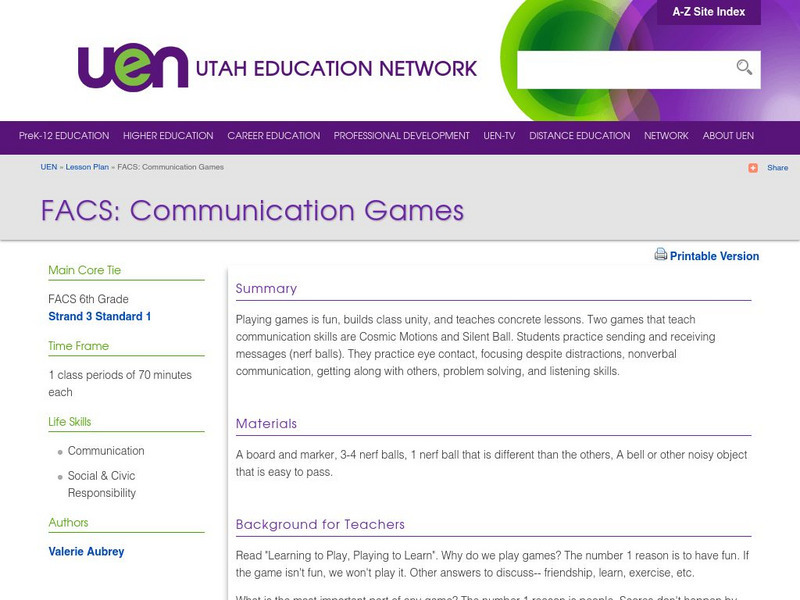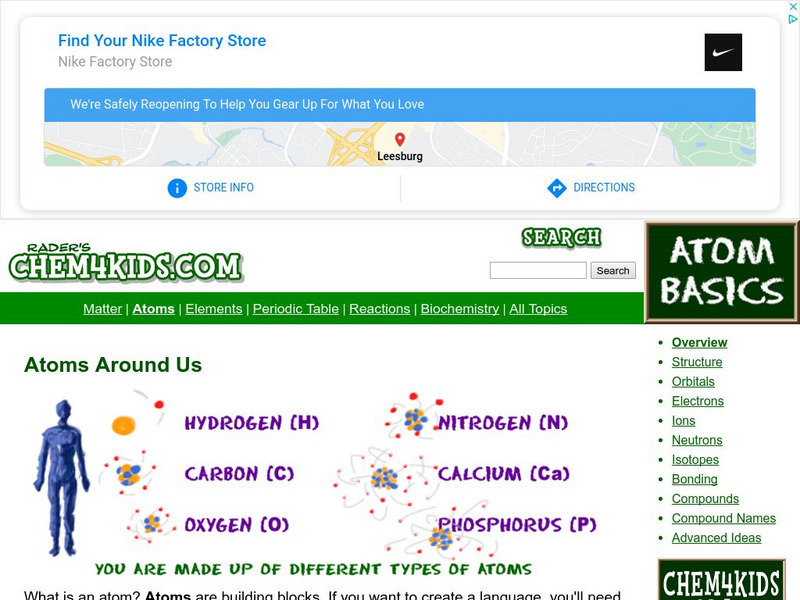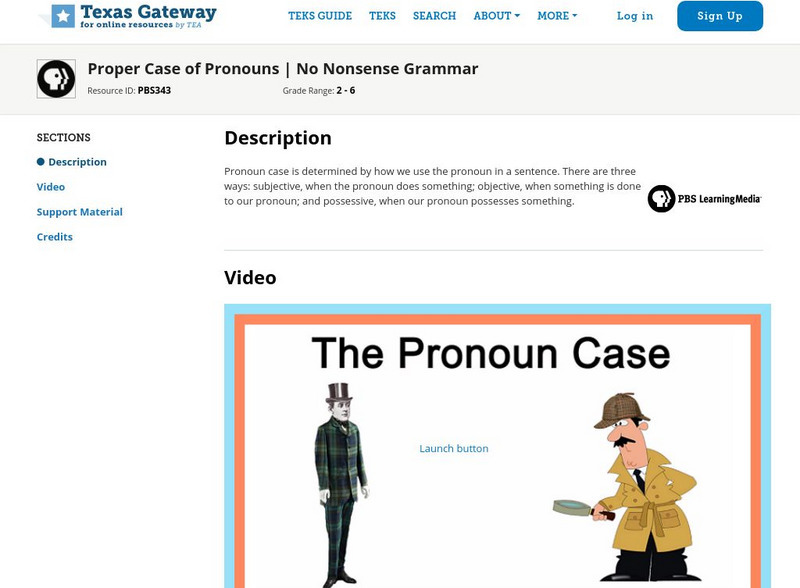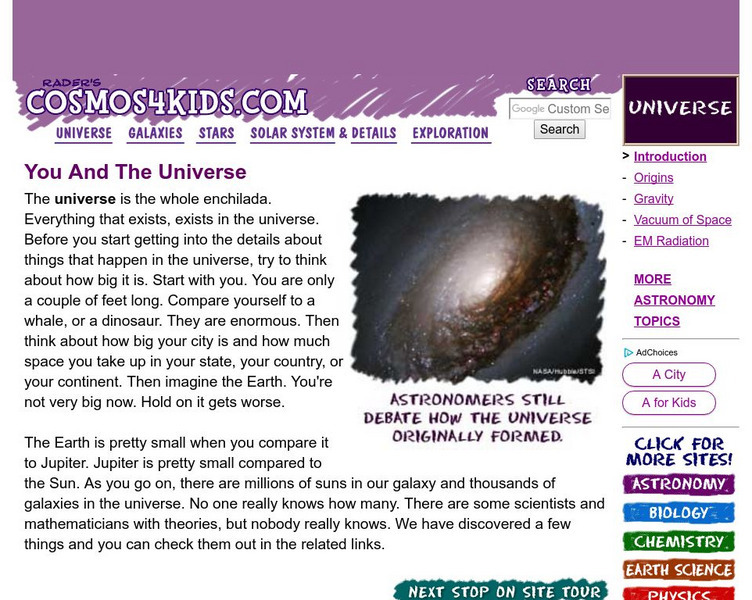Chem4kids
Chem4 Kids: Symbols in Chemical Equations
Chem4Kids! provides an overview of the symbols representing numerical values in chemical equations. Each symbol is defined and described.
Chase Young, PhD
Dr. Chase Young, Ph D: Reader's Theater Script: Rump and Ugla [Pdf]
A reader's theater script for the modern fairy tale, Rump and Ugla, is provided on these pages. Six character roles are needed in this activity.
PBS
Pbs Kids: Science Rocks: Air Lift
Through this experiment, students are challenged to lift a book (and other items) with just air. Requires simple household items, gallon-size, zipper-lock plastic bag, book, pencil, drinking straw, and tape.
PBS
Pbs Kids: Design Squad: Build: Build a Better Lunchbox
Follow the directions to build a lunchbox that will keep a frozen treat from melting.
PBS
Pbs Kids: Plum Landing: Invaders
This game is based on the PBS Kids' series, Plum Landing. Students will read various informational texts about invasive species. Then students will attempt to rid various regions of their invasive species.
PBS
Pbs Kids: Don't Buy It: Get Media Smart!: Buying Smart
Play a Price is Right style game and learn about merchandising. You will also find lots of information about advertising, brand names, and product value.
Online Writing Lab at Purdue University
Purdue University Owl: Exercise: Prepositions of Direction: To, on (To), in (To)
This Purdue University OWL (Online Writing Lab) provides practice with prepositions of directions (to, on, onto, in, into).
US Department of Energy
Need Project: Solar Oven [Pdf]
An introduction and activity to engage students in building a solar oven.
E-learning for Kids
E Learning for Kids: Science: Denmark: How Does Light Help Us See Things?
Isabella and Amalie are in Copenhagen, and they saw a periscope in the water. Join them, and find out what this is all about. This module discusses how to use a periscope, what light sources are, and how light impacts shadows.
TES Global
Tes: Nouns: Revision: Explanation Booklet
[Free Registration/Login Required] This seven-page resource provides definitions for different categories of nouns: common, proper, collective, hyphenated, compound, and abstract. Numerous examples with pictures are provided for each...
Study Languages
Study Spanish: Present Perfect
A straightforward explanation of how the present perfect tense is formed with a printer-friendly page that is great for note keeping. One free online quiz and test evaluate mastery.
Other
National Council for the Social Studies: Fear, Panic, and Injustice
What did it feel like to have to leave your home and possessions to live in a camp during WWII because you were a Japanese-American? Students will understand the climate of fear during this time and develop empathy toward the families...
Utah Education Network
Uen: Facs: Communication Games
This lesson engages students in communication games. Students will learn how to play "Cosmic Motions" and "Silent Ball" to practice communication skills.
Chem4kids
Chem4 Kids: Atoms
This site provides a detailed overview of atoms. Content explores an atom's structure, as well as what ions are, how atoms bond, what compounds are (including how to name compounds), and what isotopes are.
Annenberg Foundation
Annenberg Learner: Patterns in Mathematics: How Many Valentines?
Students look for patterns to determine how many valentines will be distributed in a class of 28 students. After trying the problem, they can look at several other methods that could be used and compare the answer they got. There is also...
Texas Education Agency
Texas Gateway: Proper Case of Pronouns | No Nonsense Grammar
Pronoun case is determined by how we use the pronoun in a sentence. There are three ways: subjective, when the pronoun does something; objective, when something is done to our pronoun; and possessive, when our pronoun possesses something.
Lin and Don Donn
Mrdonn.org: Daily Life in Olden Times: Southeast Cherokee Indians
Lesson and resources on the history of the Cherokee Indian tribe.
Utah State Office of Education
Utah Science: Matter
Discover atoms and molecules which make up matter, motion of atoms and how to measure the mass, volume and density of matter.
PBS
Pbs Learning Media: Rosa Parks: Civil Rights Activist
Through two primary source activities and a short video, students will learn about Parks' lifelong commitment to the Civil Rights Movement.
PBS
Pbs Learning Media: Sojourner Truth: Abolitionist and Women's Rights Activist
Through two primary source activities and a short biographical video, students will understand the remarkable career of this persevering woman who lived up to her self-chosen name.
Other
Usps: Oscar Micheaux: A Man Ahead of His Time
Celebrate Black History Month by studying this courageous, innovative filmmaker and entrepreneur. Discover how Mr. Micheaux overcame obstacles to become a memorable moviemaker.
E-learning for Kids
E Learning for Kids: Math: Russian Toy Store: 2 D Shapes
Mattie and her four sisters are visiting a toy store. Can you help them find different shapes in the toy store?
Cosmos 4 kids
Cosmos4 Kids: You and the Universe
What is the universe? Learn about this topic in this reference article which includes a video that discusses a finding of a distant galaxy by NASA's Hubble.
Cosmos 4 kids
Cosmos4 Kids: What Makes a Star?
Understand the three main characteristics of a star by reading this reference page and watching the short video.



![Dr. Chase Young, Ph D: Reader's Theater Script: Rump and Ugla [Pdf] Activity Dr. Chase Young, Ph D: Reader's Theater Script: Rump and Ugla [Pdf] Activity](https://d15y2dacu3jp90.cloudfront.net/images/attachment_defaults/resource/large/FPO-knovation.png)
















